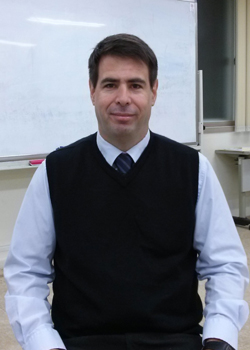 I “enjoy” long-distance running, but I find it difficult to motivate myself into putting in the required miles, as just running for miles is boring even for someone motivated. A comparison can be made between myself and language learners in Korea. That is to say that students are often focused upon the hard grind of test-taking with communication taking a back seat.
I “enjoy” long-distance running, but I find it difficult to motivate myself into putting in the required miles, as just running for miles is boring even for someone motivated. A comparison can be made between myself and language learners in Korea. That is to say that students are often focused upon the hard grind of test-taking with communication taking a back seat.Test taking is important, especially for future job seekers, but this does not mean that communication should be ignored. For those seeking to improve their communication skills, there are numerous opportunities on campus – language study groups, the International Lounge, and language exchanges are a few examples that are easily accessible to motivated students. These can be fun, but often rely upon the participating students’ levels of motivation. I would like to suggest a few different ways to “work” on building and maintaining English language skills.
1. Try a New or Different Sport
In Daegu, there are many different, mixed sports teams. Sports teams don’t just serve as exercise but offer an opportunity to travel and socialize as well. Here is a selection of sports teams that welcome new members regardless of experience or ability.
Daegu Fianna GAA Club
This is Daegu’s only Gaelic football club. Gaelic football is a traditional sport from Ireland and is like a combination of soccer, basketball and handball. It is fast and fun. If you are interested , the team can be contacted by email at pro.daegu.asia@gaa.ie or on their Facebook page at http://www.facebook.com/groups/4968316925/.
Daegu Ultimate Frisbee Club
Ultimate frisbee is an easy sport to learn and has a strong emphasis upon building bonds through sport. The Daegu Ultimate Frisbee Club can be reached through the ROK Ultimate Website at www.leaguelineup.com/rokultimate.
Daegu Dragons RFC
This is Daegu’s civilian rugby football team. The team regularly plays in monthly tournaments throughout Korea. The team can be contacted at http://daegudragons.wix.com/daegudragonsrfc/.
Daegu Softball League
This is an organization that arranges a coed spring league and several coed and single-sex softball tournaments throughout the year. The league is always looking for new members and can be reached at http://daegusoftball.com/.
2. Music and Singing
When I first came to Korea, I had a friend who could only speak simple English and was shy about his inability to communicate. He also had a love of English music, and he set himself a goal that he would be able to sing and play three songs in English in front of an audience by the end of that year. Nine years later, he plays in three bands and owns a business dealing mainly with English-speaking customers. However, there is a more accessible, cheaper, and easier option available in the form of karaoke/noraebang. Not only does singing songs in English help build confidence and introduce new vocabulary, it also helps with pronunciation, intonation, and rhythm of speech, and it is fun to do with friends.
3. Movies/TV Shows
Movies and TV shows are often used in both classrooms and in on-line language courses. Normally students watch part of a TV show or movie with or without subtitles and answer questions about what they see and hear. A more interactive method is to use scripts to practice English. Participants choose a part of a movie or a TV show and download the script (http://www.simplyscripts.com/). They act out the scene together and then watch in on DVD to see how the scene should go. The participants then act the scene out again, but with a twist. Every person chooses a card from a bag. Each of these cards has an emotion on it. The participants then act the scene out again, but this time, they act their part with the emotion they have selected. This can be very funny and especially helps in developing better English intonation.
4. Immersion Programs
Keimyung University operates several English language immersion programs, such as the KELI program, the ACE English Camp, and English House. Students on these programs live in English-only dormitories and are not allowed to use Korean. This is ideal for the students as it provides them with natural situations in which to use English to communicate – essentially “living is learning.” The KELI program is especially good, as it runs during the semester and holds several events in which all the students are encouraged to come together and socialize.
“Working” at building or maintaining your English language skills doesn’t have to be a struggle. Try something different, and who knows? It may not feel like “work” after all.
By Quentin Vyvyan Adams Stollery
Prof., College of Liberal Education
maverciq@hotmail.com
Prof., College of Liberal Education
maverciq@hotmail.com








